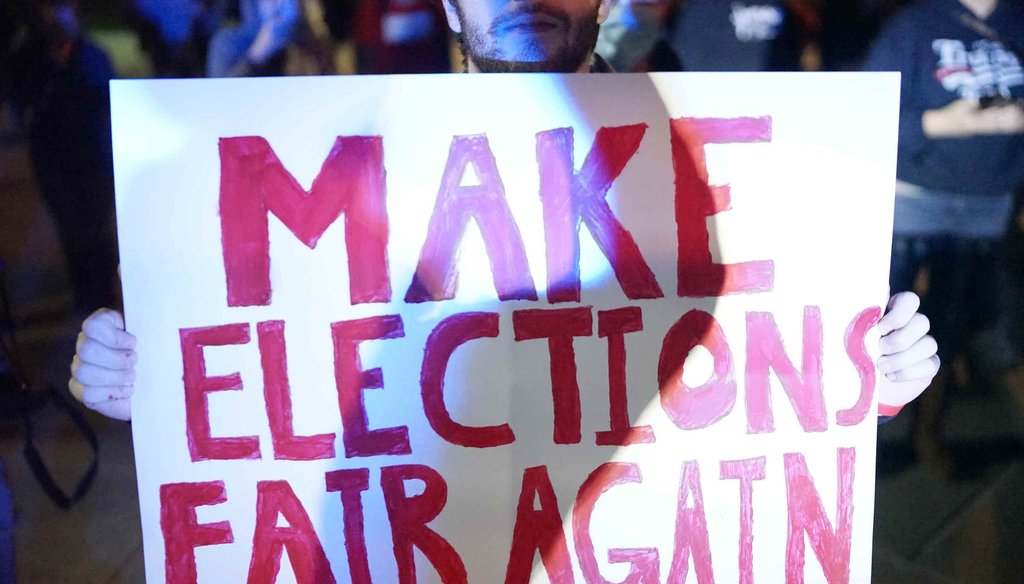Stand up for the facts!
Our only agenda is to publish the truth so you can be an informed participant in democracy.
We need your help.
I would like to contribute

A Trump supporter holds up a sign during a protest outside the TCF Center on Thursday, Nov. 5, 2020, in Detroit. A judge dismissed a challenge from the Trump campaign to stop ballot counting in Michigan. (Antranik Taviti, Detroit Free Press)
If Your Time is short
-
The Michigan Senate Elections Committee has begun reviewing a controversial series of GOP election bills.
-
During the hearings held so far, Republican lawmakers have made several claims that are inaccurate, misleading or missing context.
Michigan’s Senate Elections Committee has held three hearings so far on GOP-backed election bills that would place new requirements on voters.
Republicans have sold their 39-bill legislative push as an effort to beef up election security and restore faith in the election process. Voting rights advocates and election officials say some of the proposals would disenfranchise voters by making it harder to vote.
The bills include measures that would impose stricter voter ID requirements, shorten the deadline for returning ballots via drop boxes, prohibit clerks from providing prepaid postage for returning ballots and ban the secretary of state from sending absentee ballot applications to voters. Less contentious proposals would extend the time to canvass elections, require training for election challengers and establish a day of early in-person voting.
PolitiFact Michigan took a look at some of the claims made by Republican lawmakers in support of the proposed legislation and found some were inaccurate, misleading or missing context.
This is inaccurate, according to polling Johnson cited.
Johnson, a former secretary of state who chairs the Elections Committee, misstated the findings of a Detroit News poll she cited, her chief of staff, Garrett Wheat, acknowledged in an email to the PolitiFact Michigan.
Nearly two-thirds of Michigan voters believe the presidential election was mostly fair, according to the poll. A majority of Republican voters, meanwhile, said they believed there was widespread fraud, including 83% of people who identified themselves as "Trump Republicans" and 56% who identified as "traditional Republicans," the poll found.
Wheat said that Johnson believes mistrust in the election process is "a broader problem." Wheat pointed to an October 2020 Reuters/Ipsos poll that found that more than 4 in 10 supporters of Trump and Biden said they would not accept the outcome of the election if their preferred candidate lost.
This is misleading.
Republicans control the state House and Senate, and could certainly pass the legislation without a single Democratic vote. But they do not have enough votes in either chamber to override a threatened veto by Democratic Gov. Gretchen Whitmer.
Still, Michigan’s Constitution provides an avenue to circumvent the governor.
Michigan GOP Chairman Ron Weiser has already laid out a plan to pursue a petition initiative that would allow the GOP proposals to become law without Whitmer’s support, or put them on the ballot for voters to approve.
Wheat said Johnson has not had any direct discussions with the Michigan GOP on such an initiative.
A pending bill would require the secretary of state to establish an "objective signature verification process" that would explicitly prohibit local clerks from presuming that the voter’s signature on an absentee ballot envelope is valid.
McBroom said that bill is "basically taking the judge’s orders" in a March elections case "and placing the orders that he gave into a statute to initiate the process."
That’s inaccurate.
Ahead of the 2020 election, Secretary of State Jocelyn Benson provided guidance on signature verification that told clerks to presume the signatures on absentee ballot envelopes were valid. In March, the Michigan Court of Claims ruled that Benson didn’t follow the procedure required for promulgating the verification rules.
But the court didn’t rule on whether Benson’s guidance itself violated Michigan election law.
This is misleading.
In an effort to help voters exercise their right to vote absentee during the pandemic, Benson’s office sent out absentee ballot applications to every registered voter in the state ahead of the August primary.
During an April 21 hearing, Johnson claimed that 800,000 people who were not qualified to vote received prefilled applications to request an absentee ballot.
"There’s nothing more important than having a qualified voter file that only has qualified people on it," she said.
Wheat wrote that the source for the claim was Johnson’s "own conservative estimate" based on her experience as secretary of state and the systems in place for detecting whether voters move out of state.
"Our office received literally hundreds of examples of applications that were delivered to a residence where someone no longer resided because they had moved or died," Wheat said.
Johnson’s 800,000 estimate is not "hard data or fact," Tracy Wimmer, a spokesperson for the Secretary of State’s office, wrote in an email.
An estimated 500,000 applications were returned to the Bureau of Elections following the statewide mailing, mostly because of incorrect addresses listed for a voter who had moved, she said. According to Wimmer, no one who was not qualified to vote received an application. "They may have been on the inactive voter list, but those people are still eligible to vote," she said.
Voters have to sign their application for an absentee ballot, and clerks must verify the voter’s signature before sending out an absentee ballot.
This is misleading.
Hall was citing a 2019 report from the auditor general that identified 230 registered voters whose birthdates in files indicated that they were 122 years or older. Hall has introduced legislation requiring these voters to verify their birthdates.
Michigan election officials intentionally assign voters with unknown birth dates a placeholder date — usually more than a century in the past — so they can be flagged for follow-up.
In the aftermath of the 2020 election, this procedure was seized upon by Trump allies to imply that people long dead voted in the Nov. 3 election.
McBroom told the PolitiFact Michigan that he knows voters assigned a placeholder birth date in the 2020 election were "people who really exist," but said he couldn’t speak to whether that’s the case with the auditor general report’s finding. In its response published along with the report, Benson's department said most of those voters flagged in the audit as 122 or older are not actually that old.
This is missing context.
Under Michigan election law, clerks cannot count ballots cast by voters who die before Election Day, but there was at least one case identified in the Nov. 3 election where a few such ballots were mistakenly counted.
Johnson said that legislation that would give county clerks access to voter rolls to flag voter registration records for deceased voters would help ensure such errors don’t happen.
Wimmer, from the Secretary of State’s office, said that county clerks are supposed to provide lists of deceased individuals to municipal clerks before election day.
After the Nov. 3 election, Clinton Township’s clerk received death certificates from the Macomb County clerk’s office for 10 people who died in October but whose ballots were counted, according to a WXYZ report. Johnson said her aunt was among them.
"There is always the possibility that the information will not make it to the clerk in time," Wimmer wrote. She said her office is not aware of widespread reports of ballots from voters who died before Election Day being counted.
In the Nov. 3 election, clerks across the state identified 3,469 absentee ballots submitted by voters who died before Election Day. Those ballots weren’t counted.
Our Sources
Detroit Free Press, GOP lawmakers say their election bills will make it easier to vote. A fact check, 4/2/21
Detroit Free Press, Michigan GOP senators file 39 election reform bills Democrats call racist, based on lies, 5/11/21
Senate Elections Committee, hearing, 4/28/21
Senate Elections Committee, hearing, 4/21/21
Senate Elections Committee, hearing, 5/5/21
Detroit Free Press, House passes election reforms aimed at cleaning up voter rolls, supporting absentee voting, 3/9/21
Detroit Free Press, GOP elections bills blasted by corporate leaders, Mayor Duggan, head of NAACP, 4/13/21
Michigan Secretary of State, Rejected ballot data from Nov. 3 election demonstrates integrity of election, 12/2/20
WXYZ, Clerk says dead people’s votes counted in Clinton Twp. due to mistake by county clerk, 11/11/20
The Detroit News, Biden's win disputed as Michigan poll finds 'sizable wedge' believe fraud claims, 2/10/21
The Detroit News, Michigan Republicans question if voters trust elections; polling says most do, 5/5/21
Michigan Legislature, Senate Bill 308, introduced 3/24/21
Reuters, Four in ten supporters of Biden, Trump would not accept election defeat: Reuters/Ipsos poll, 10/25/20
Office of the Auditor General, Bureau of Elections, December 2019
Detroit Free Press, Kayleigh McEnany confuses standard election process for fraud in Detroit, 11/12/20
Detroit Free Press, Gilchrist condemns Michigan GOP plan to circumvent Whitmer veto on election bills, 4/1/21
Detroit Free Press, How Michigan's system for approving voter-initiated laws is a national outlier, 5/3/21
Garrett Wheat, Sen. Ruth Johnson, Chief of Staff, email, 5/7/21
Garrett Wheat, Sen. Ruth Johnson, Chief of Staff, email, 5/10/21
Jocelyn Benson, Michigan Secretary of State, letter to Senate Elections Committee, 9/2/20
Denny Schwarze, House Republican Caucus Services, Communications Advisor, email, 5/10/21
Tracy Wimmer, The Office of Secretary of State Jocelyn Benson, Director of Media Relations, email, 5/11/21












































